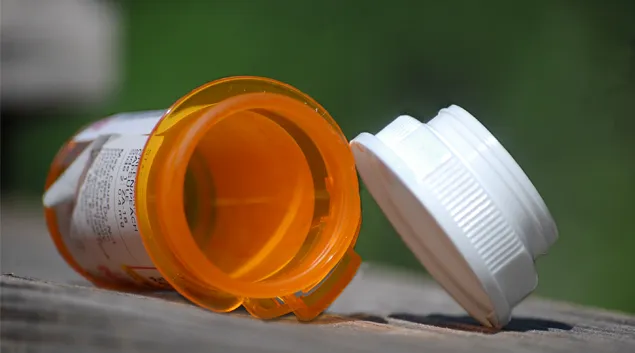
The U.S. Food and Drug Administration has issued emergency use authorizations for Pfizer's and Merck's antiviral COVID-19 pills.
The FDA gave emergency use authorization to Pfizer's pill on Wednesday and announced the Merck approval today.
The FDA issued an emergency use authorization (EUA) for Pfizer's Paxlovid for the treatment of mild-to-moderate COVID-19 in adults and pediatric patients, the agency announced this week.
The treatment has been cleared for anyone 12 years old and older who weighs at least 88 lbs., and for anyone, child or adult, who is at high risk for progression to severe COVID-19, including hospitalization or death.
Paxlovid is available by prescription only and should be initiated as soon as possible after diagnosis of COVID-19, and within five days of symptom onset.
Importantly, the drug is not authorized for the prevention of COVID-19, or for treating those already requiring hospitalization due to severe or critical COVID-19. It's also not a substitute for vaccination in those for whom the shot and a booster dose are recommended.
At the same time, the FDA has also approved an antiviral COVID-19 treatment developed by Merck, which the FDA's Antimicrobial Drugs Advisory Committee voted 13-10 to authorize earlier this month.
Safety concerns include a recommendation that the drug not be used during pregnancy.
Many committee members said their vote was a difficult decision. Those who voted "yes" said the drug's benefits outweigh the risks, while those who rejected recommendation cited safety concerns, the need for more data and the lack of a benefit for those who have a mild-to-moderate case of the coronavirus.
WHAT'S THE IMPACT?
Paxlovid consists of nirmatrelvir, which inhibits a SARS-CoV-2 protein to stop the virus from replicating, and ritonavir, which slows down nirmatrelvir's breakdown to help it remain in the body for a longer period at higher concentrations. Paxlovid is administered as three tablets (two tablets of nirmatrelvir and one tablet of ritonavir) taken together orally twice daily for five days, for a total of 30 tablets. It's not authorized for use for longer than five consecutive days.
The issuance of an EUA is different from an FDA approval. In determining whether to issue an EUA, the FDA evaluates the existing scientific evidence and balances any known or potential risks with any known or potential benefits. Based on the FDA's review of the scientific evidence currently available, the agency has determined it's reasonable to believe that Paxlovid may be effective for the treatment of mild-to-moderate COVID-19 in authorized patients.
The agency has also determined that the known and potential benefits of Paxlovid, when used consistently with the terms and conditions of the authorization, outweigh the known and potential risks.
There are currently no adequate, approved and available alternatives to Paxlovid for coronavirus treatment.
The primary data supporting the EUA, the FDA said, is from EPIC-HR, a randomized, double-blind, placebo-controlled clinical trial studying Paxlovid for the treatment of non-hospitalized symptomatic adults with a laboratory confirmed diagnosis of SARS-CoV-2 infection. Patients were adults 18 years old and older with a pre-specified risk factor for progression to severe disease, or were 60 and older regardless of pre-specified chronic medical conditions.
None of the patients had received a COVID-19 vaccine, and none had been previously infected with COVID-19. The main outcome measured in the trial was the proportion of people who were hospitalized due to COVID-19 or died due to any cause during 28 days of follow-up.
Paxlovid significantly reduced the proportion of people with COVID-19-related hospitalization or death from any cause by 88%, compared with the placebo group among patients treated within five days of symptom onset and who did not receive COVID-19 therapeutic monoclonal antibody treatment, according to the FDA.
In this analysis, 1,039 patients had received Paxlovid, and 1,046 patients had received placebos; among these patients, 0.8% who received Paxlovid were hospitalized or died during 28 days of follow-up, compared with 6% of the patients who received placebos. The FDA continues to monitor the drug's safety and effectiveness.
Possible side effects of Paxlovid include impaired sense of taste, diarrhea, high blood pressure and muscle aches. Using it at the same time as certain other drugs may result in potentially significant drug interactions, the FDA said. Using it in people with uncontrolled or undiagnosed HIV-1 infection may lead to HIV-1 drug resistance. Ritonavir may cause liver damage, so caution should be exercised when giving Paxlovid to patients with pre-existing liver diseases, liver enzyme abnormalities or liver inflammation.
Because Paxlovid works, in part, by inhibiting a group of enzymes that break down certain drugs, it's contraindicated with certain drugs that are highly dependent on those enzymes for metabolism, and for which elevated concentrations of certain drugs are associated with serious and/or life-threatening reactions. Paxlovid is also contraindicated with drugs that, conversely, strongly induce those same enzymes, leading to the faster breakdown of nirmatrelvir or ritonavir, as reduced concentrations of either may be associated with potentially losing virologic response and developing viral resistance.
Paxlovid cannot be started immediately after discontinuing such medications because the effects of those medications remain after discontinuation.
Paxlovid is not recommended in patients with severe kidney or severe liver impairment. In patients with moderate renal impairment, a reduced Paxlovid dose is needed.
The FDA has released fact sheets for healthcare providers and for patients and caregivers.
THE LARGER TREND
The Biden White House in November secured 10 million treatment courses of Paxlovid at a cost of about $5 billion, contingent on EUA or approval from the FDA. Through the purchase agreement, the U.S. government will receive 10 million treatment courses for $5.295 billion, with the first courses delivered by the end of the year.
On Nov. 26, Merck said their molnupiravir offering reduced the risk of hospitalization or death from 9.7% in the placebo group to 6.8% in the molnupiravir group, for an absolute risk reduction of 3%. Nine deaths were reported in the placebo group and one in the molnupiravir group.
Twitter: @JELagasse
Email the writer: jeff.lagasse@himssmedia.com